Targum Shlishi is committed to bringing the remaining Nazi war criminals to justice, in the belief that these individuals must be held fully accountable for their crimes, regardless of the passage of time. To that end, Targum Shlishi has provided ongoing support for the Israel office of the Simon Wiesenthal Center, an international Jewish human rights organization that focuses on preserving the memory of the Holocaust and promoting justice. In particular, Targum Shlishi works closely with Dr. Efraim Zuroff, director of the Israel office, and the foundation often assumes an active role in initiatives. Targum Shlishi has supported Dr. Zuroff’s efforts in locales as diverse as Costa Rica, Croatia, Iceland, Lithuania, Latvia, and Estonia.
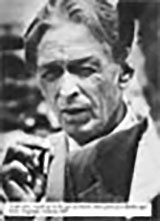
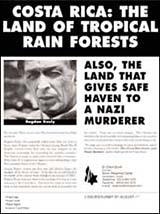
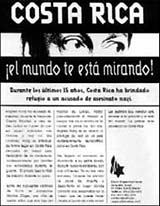
Bogdan Koziy, Costa Rica
Bogdan Koziy, a member of the Ukrainian Security Police during World War II, is accused of Nazi war crimes, including killing 12 people and helping the Gestapo round up Jews for eventual transfer to concentration camps. Targum Shlishi provided essential support and input for the Simon Wiesenthal Center’s efforts in seeking the extradition of Koziy from Costa Rica.
These efforts followed several earlier attempts to bring Koziy to justice. During the past 20 years, Koziy has repeatedly been a focus of attention for the US and USSR governments, and he managed to avoid extradition to the USSR twice. Koziy lived in the US from 1949 until 1984, when he fled to Costa Rica to avoid extradition. In 1986, the USSR requested his extradition from Costa Rica, which was first denied, then approved, and then canceled in 1987. The World Jewish Congress launched a global campaign in 1994 for his extradition, but it was unsuccessful. In 1995, the Simon Wiesenthal Center kicked off a new campaign to convince Costa Rica to expel Koziy.
Targum Shlishi also initiated a letter-writing and e-mail campaign to Costa Rica’s then-president, Jose Maria Figueres. The letter read, in part, “During World War II, Koziy personally participated in the murder of at least 12 Jews…It is a travesty of justice that this murderer is allowed to live in Costa Rica.” Tens of thousands of letters and e-mails were sent.
Targum Shlishi then conceived, developed, and funded an advertising strategy with Dr. Efraim Zuroff, the director of Israel office of the Simon Wiesenthal Center, designed to pressure the Costa Rican government to expel Koziy. An advertisement ran in the local San José newspaperExtra, urging this action. Then a second, extremely incendiary ad targeting the travel industry was prepared and sent, ready for print, to the Costa Rican ambassador to the US expressly for the purpose of urging him to action. That ad’s headline was, “Costa Rica: The Land of Tropical Rain Forests. Also, the Land that Gives Safe Haven to a Nazi Murderer.” Soon after that, in early 2001, the supreme court of Costa Rica upheld an expulsion order against Koziy. He is now in hiding. Targum Shlishi did not run the ad; the threat alone spurred Costa Rica to take action against Koziy.
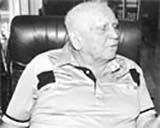
Evald Mikson, Reykjavik, Iceland
Evald Mikson, an Estonian living in Iceland, was accused of Nazi war crimes in conjunction with his position during World War II as the leader of an Estonian vigilante squad. Among the accusations were that he had murdered 30 people and was responsible for the deaths of an additional 150. He had changed his name to Edvald Hinriksson and was a well-known and popular figure in Iceland, who was known as “the father of Icelandic basketball”; his sons were members of the national soccer team.
Targum Shlishi provided funding for the Wiesenthal Center’s Efraim Zuroff to travel to Iceland, present documentation to government officials, and meet with members of the local media. Targum Shlishi’s director, Aryeh Rubin, accompanied Dr. Zuroff on this trip and negotiated the appointment of a special prosecutor. In addition, Targum Shlishi worked with the Simon Wiesenthal Center on a letter-writing campaign to Icelandic Prime Minister David Oddsson in an effort to persuade the Icelandic government to take action. About 10,000 letters were sent, including a petition from 85 members of the Knesset (Israel’s parliament). In 1993, the Icelandic government made the decision to pursue a criminal investigation of Mikson, who died before he could be brought to trial.

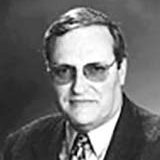
Operation Last Chance: Rewards for Justice, Simon Wiesenthal Center
Targum Shlishi, in conjunction with the Simon Wiesenthal Center, initiated a campaign in 2002 to maximize efforts to bring the remaining Nazi war criminals to justice by offering financial rewards for information leading to their arrest and conviction. Targum Shlishi proposed the project and provided the core funding for it. The project is coordinated through the Israel office of the Simon Wiesenthal Center under the aegis of Dr. Efraim Zuroff.
A major impetus for this project is the rapidly diminishing chances of successfully prosecuting Nazi war criminals. Suspects and witnesses are aging, and there is a lack of political will in the countries where the crimes occurred and the countries in which suspects reside. Operation Last Chance seeks to combat these circumstances by encouraging eyewitnesses to come forward with the promise of $10,000 rewards.
The program will be publicized through intensive advertising and media campaigns in countries such as Germany, Austria, Lithuania, Latvia, Estonia, and Poland, where Nazi war crimes were committed with the acquiescence or participation of the local populations. Émigré newspapers in countries of refuge, including the US, Australia, Canada, and Argentina, will also be targeted. The rewards will be awarded to informants only if suspects are convicted, sentenced, and punished by courts of law.
The project has been launched in Lithuania, Latvia, and Estonia, and dozens of leads have already resulted from the advertising and local publicity. The Lithuanian government has initiated formal investigations into two collaborators and private investigations sponsored by Targum Shlishi are ongoing. Belorussia and the Ukraine are the next target countries.
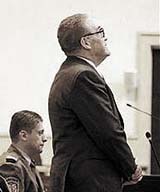
Dinko Sakic, Zagreb, Croatia
Dinko Sakic was the commander of Croatia’s Jasenovac concentration camp in 1944. Jasenovac, known as the “Auschwitz of the Balkans,” was where up to 85,000 inmates perished between 1941 and 1945. In 1999, the 78-year-old Sakic, the last known living commander of a concentration camp, was convicted by a Croatian court for crimes against humanity after a six-month trial. He was found responsible for the killings of 2,000 people during the months he ran the camp. He received a 20-year sentence, the maximum punishment.
Sakic had lived in Argentina from 1945, when he fled Croatia, until 1998, when he was extradited. During the trial, Sakic admitted to being the commander of Jasenovac and said he was proud of it. He pleaded not guilty, claiming that during the few months of his rule over the camp no crimes were committed. According to Reuters wire service, “He showed little visible remorse during the trial and even jeered at some inmates’ testimonies.” When the verdict was announced, he smiled and applauded, according to the New York Post.
Targum Shlishi helped support the Wiesenthal Center’s efforts in this case, and representatives from both organizations traveled to Croatia on two occasions, including the trial, to meet with officials and present evidence.
“The passage of time in no way diminishes the crimes committed or the responsibility of the perpetrator,” the Wiesenthal Center’s Efraim Zuroff wrote in a description of the trial.
DLANG (Don’t Let Australian Nazis Go), Australia
In 1992, the Australian government decided to shut down its Special Investigations Unit responsible for investigating suspected Nazi war criminals living in Australia. Of major concern to the Simon Wiesenthal Center was the large number of alleged Nazi war criminals residing in Australia and the coincidence of Australia’s decision with the emergence of democracies in much of Eastern Europe. With countries such as Lithuania, Latvia, Estonia, and others adopting democracy, there would be greater access to wartime records and new opportunities to investigate and prosecute Nazi war criminals.
Targum Shlishi initiated and coordinated a letter-writing campaign to Australian Foreign Minister Gareth Evans with the objective of generating tens of thousands of letters to the Australian government. “Bearing in mind the surge in neo-Nazi activities worldwide, the atrocities being committed in Yugoslavia, and the new evidence coming out of the Baltic states, the free world has an obligation to ensure that perpetrators of war crimes be brought to justice, regardless of the passage of time,” the letter stated.
In addition, Targum Shlishi provided funds that allowed the Wiesenthal Center’s Efraim Zuroff to travel to Australia and draw public attention to this issue. Dr. Zuroff submitted a new list of Australian suspects, which attracted notice and helped “to keep the issue alive—despite government attempts to ignore it,” Dr. Zuroff said.

